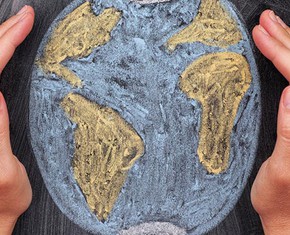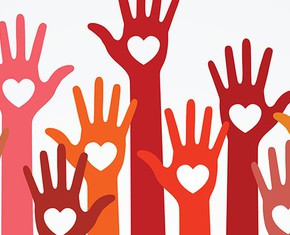The views expressed in our content reflect individual perspectives and do not represent the authoritative views of the Baha'i Faith.
Abdu’l-Baha, the exemplar of the Baha’i Faith, said “Think ye at all times of rendering some service to every member of the human race.” – Selections from the Writings of Abdu’l-Baha, p. 3.
At some point in life it may be natural to consider rendering an important service to others. We may be grateful for our own good fortune and may wish to give something back for it, or we may have a cause or issue that has great personal meaning to us, a cause to which we would gladly give our time and energy.
We commonly view service to others as something above and beyond what we would “normally” do. But what if we were to expand that concept and infuse the spirit of service—kindness shown without thought of self-promotion or self-gain—into everything we do? What if we were to take the lessons learned from spiritually transforming ourselves, our family life, and the lives of those around us and apply them to our interactions with each other by serving one another? These final essays in our series discuss the spiritual meaning of service and how it can be a catalyst for bringing a community together.
Of course, the social and spiritual needs of the world evolve over time, and the social requirements of each age differ because civilization itself evolves and changes. The needs of humanity shift as we progress. As the Baha’i principle of progressive revelation explains, to enable us to continue the advancement of civilization, we have received teachings, wisdom and commandments that are renewed and expanded from time to time by God’s prophets.
From the earliest times, love has always been a bond that unites people. However, the circle of who we need to love has grown. At one time, when the possibilities of communication and travel were very limited, it was sufficient to love one another and to love our neighbors as ourselves, because everyone else lived so far away. Later, as our exposure to the world expanded, it was appropriate to love the tribe, the city, and the nation to which we belonged as well. Now we need to love the entire family of humankind. In an age when it is possible to communicate instantaneously with people virtually anywhere in the world, no one is too far away to be loved, and one of the best ways we can show that love is by serving each other:
Man’s merit lieth in service and virtue and not in the pageantry of wealth and riches. Take heed that your words be purged from idle fancies and worldly desires and your deeds be cleansed from craftiness and suspicion. Dissipate not the wealth of your precious lives in the pursuit of evil and corrupt affection, nor let your endeavours be spent in promoting your personal interest. Be generous in your days of plenty, and be patient in the hour of loss. Adversity is followed by success and rejoicings follow woe. Guard against idleness and sloth, and cling unto that which profiteth mankind, whether young or old, whether high or low. – Baha’u’llah, Tablets of Baha’u’llah, p. 138.
Love is not the only commandment God has given us that can expand to meet the needs of a worldwide community. In the past we were given an injunction known as the Golden Rule, which admonishes us to do unto others as we would have them do unto us. This helped to define our standard of interaction with each other and established the foundation for behavioral reciprocity.
The Baha’i teachings stress that service to others needs to take center stage as a new Golden Rule, declaring that we should prefer others over ourselves. Service is a bond that brings people together; like love, it does not arise from obligation but from a selfless concern for the well-being of others. Service, the Baha’i teachings say, can be a means of worshiping God:
… all effort and exertion put forth by man from the fullness of his heart is worship, if it is prompted by the highest motives and the will to do service to humanity. This is worship: to serve mankind and to minister to the needs of the people. Service is prayer. – Abdu’l-Baha, Paris Talks, pp. 176-177.
Man can receive no greater gift than this, that he rejoice another’s heart. – Abdu’l-Baha, Selections from the Writings of Abdu’l-Baha, pp. 203-204.
In this age the worship of God is not restricted to prayerfulness and piety. Our intentions and actions can be like a prayer in thought and deed, and work performed in the spirit of service is a legitimate form of worship. No matter what our occupation may be, we can pursue it in an attitude of helpfulness and joy.
Baha’is believe it is no longer sufficient merely to feel love for one another; we must demonstrate that love by helping others. In a time when we distance ourselves from others and content ourselves with loving one another from afar, or understand the concept of caring for each other but don’t put it into action, the best way to unite and transform the world we live in is to turn our lofty ideals into tangible deeds. An old proverb states that God helps those who help themselves. This is still true, but God also helps those who help others.
















Comments
Sign in or create an account
Continue with Googleor